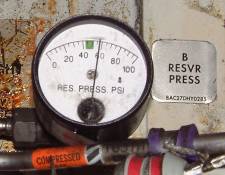 737-3/500 Pneumatics Panel | See also Air Conditioning & Pressurisation GeneralThe pneumatic system can be supplied by engines, APU or a ground source. The manifold is normally split by the isolation valve. With the isolation valve switch in AUTO, the isolation valve will only open when an engine bleed air or pack switch is selected OFF. Air for engine starting, air conditioning packs, wing anti-ice and the hydraulic reservoirs comes from their respective ducts. Air for pressurisation of the water tank and the aspirated TAT probe come from the left pneumatic duct. External air for engine starting feeds into the right pneumatic duct. Ground conditioned air feeds directly into the mix manifold. The minimum pneumatic duct pressure (with anti-ice off) for normal operation is 18psi. If engine bleed air temperature or pressure exceed limits, the BLEED TRIP OFF light will illuminate and the bleed valve will close. You may use the TRIP RESET switch after a short cooling period. If the BLEED TRIP OFF light does not extinguish, it may be due to an overpressure condition. Bleed trip off’s are most common on full thrust, bleeds off, take-off’s. The reason is excessive leakage past the closed hi stage valve butterfly which leads to a pressure build up at the downstream port on the overpressure switch within the hi stage regulator. The simple in-flight fix is to reduce duct pressure by selecting CLB-2 and/or using engine and/or wing anti-ice. WING-BODY OVERHEAT indicates a leak in the corresponding bleed air duct. This is particularly serious if the leak is in the left hand side, as this includes the ducting to the APU. The wing-body overheat circuits may be tested by pressing the OVHT TEST switch; both wing-body overheat lights should illuminate after a minimum of 5 seconds. This test is part of the daily inspection. |
 737-400 Pneumatics Panel | Differences1/200′s – The PACK switches are simply OFF/ON, rather than OFF/AUTO/HIGH on all other series.4/8/900′s – Have two recirc fans for pax comfort and PACK warning lights instead of PACK TRIP OFF. See Air conditioning for an explanation. There are also two sidewall risers either side instead of one on all other series, this is why there appear to be two missing windows forward of the engine inlet.  737-400 Sidewall risers |
 | The hydraulic reservoirs are pressurised to ensure a positive flow of fluid reaches the pumps. A from the left manifold and B from the right. See wheel-well fwd. |
Schematic Schematic courtesy of Derek Watts | |
Limitations
| Max external air pressure: | 60 psig |
| Max external air temp: | 450°F / 232°C |
| One pack may be inoperative provided maximum altitude is: | FL250 |
 737-3/500 Pneumatics Panel | See also Air Conditioning & Pressurisation GeneralThe pneumatic system can be supplied by engines, APU or a ground source. The manifold is normally split by the isolation valve. With the isolation valve switch in AUTO, the isolation valve will only open when an engine bleed air or pack switch is selected OFF. Air for engine starting, air conditioning packs, wing anti-ice and the hydraulic reservoirs comes from their respective ducts. Air for pressurisation of the water tank and the aspirated TAT probe come from the left pneumatic duct. External air for engine starting feeds into the right pneumatic duct. Ground conditioned air feeds directly into the mix manifold. The minimum pneumatic duct pressure (with anti-ice off) for normal operation is 18psi. If engine bleed air temperature or pressure exceed limits, the BLEED TRIP OFF light will illuminate and the bleed valve will close. You may use the TRIP RESET switch after a short cooling period. If the BLEED TRIP OFF light does not extinguish, it may be due to an overpressure condition. Bleed trip off’s are most common on full thrust, bleeds off, take-off’s. The reason is excessive leakage past the closed hi stage valve butterfly which leads to a pressure build up at the downstream port on the overpressure switch within the hi stage regulator. The simple in-flight fix is to reduce duct pressure by selecting CLB-2 and/or using engine and/or wing anti-ice. WING-BODY OVERHEAT indicates a leak in the corresponding bleed air duct. This is particularly serious if the leak is in the left hand side, as this includes the ducting to the APU. The wing-body overheat circuits may be tested by pressing the OVHT TEST switch; both wing-body overheat lights should illuminate after a minimum of 5 seconds. This test is part of the daily inspection. |
 737-400 Pneumatics Panel | Differences1/200′s – The PACK switches are simply OFF/ON, rather than OFF/AUTO/HIGH on all other series.4/8/900′s – Have two recirc fans for pax comfort and PACK warning lights instead of PACK TRIP OFF. See Air conditioning for an explanation. There are also two sidewall risers either side instead of one on all other series, this is why there appear to be two missing windows forward of the engine inlet.  737-400 Sidewall risers |
 | The hydraulic reservoirs are pressurised to ensure a positive flow of fluid reaches the pumps. A from the left manifold and B from the right. See wheel-well fwd. |
Schematic Schematic courtesy of Derek Watts | |
Limitations
| Max external air pressure: | 60 psig |
| Max external air temp: | 450°F / 232°C |
| One pack may be inoperative provided maximum altitude is: | FL250 |
No comments:
Post a Comment